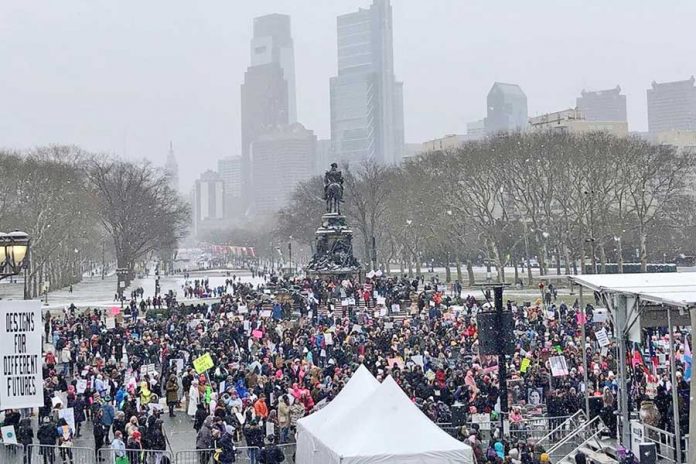The snow was intermittent, but the weather did not deter thousands from gathering on the Parkway for the Women’s March for the fourth straight year.
The seven women organizers, including trans woman and local LGBTQ activist Deja Alvarez, promoted the event widely, noting, “After record-breaking elections of women, and specifically women of color and LGBTQ candidates, it is time to celebrate what we’ve accomplished and come together again in solidarity to proclaim what we will continue to fight for.”
It was a big year for the march. 2020 is the 100th anniversary of women winning the right to vote in the U.S. In focus for organizers and rally speakers — which included Mayor Jim Kenney — were the critical presidential election and the assault on the rights of women, LGBTQ folks, people of color and immigrants under the Trump administration and how that is impacting Philadelphians.
Alvarez, is co-president of the board of directors of the Philadelphia Women’s March, with Amy Martin, another local activist, whose work focuses on impoverished kids and disability issues.
About this year’s march, Alvarez, who ran for City Council in 2019, said, in 2020, it’s “really important more now than it has ever been that we get out and make sure that our vote counts.”
Alvarez said the first year she was a speaker, and for the past three years, she has been an organizer. She said she was “pleased to see so many more queer-presenting people” at the Jan. 19 march.
Temple student Maya Davis was one of them. Attending the march was “essential. We had to go,” she said of herself and her partner. Davis identifies as “a queer disabled Black activist lesbian, and all those terms are of equal importance to me.” She said she has been working as a volunteer on campus to “get LGBTQ people of color registered to vote. Trump wants to harm every member of every family I am part of.”
Mental health activist Emma Morris, a lesbian who said she wants to represent LGBTQ inclusion at the Women’s March, said, “It was empowering to be surrounded by women of all ages, many of whom brought their children.”
Morris, a Germantown resident who has attended previously, said, “One young man said he is now old enough to vote and felt he should join his mother at the march to support women’s rights and reproductive rights.”
Morris said, “I felt immensely proud, even though he wasn’t my son.” She said she was glad to see queer parents in attendance at the march because “these kids’ futures are under threat from this climate-denying, LGBTQ-hating president.”
Morris is also concerned about gun violence in the city, which she said has impacted her and her neighborhood directly. Gun violence was an issue that Alvarez wanted to have addressed at this year’s march.
For Alvarez, the increased presence of attendees like Davis and Morris is a sign she is having the impact she wanted.
“It was a great turnout,” said Alvarez. She ticked off the list of issues that speakers addressed and how they were different “because of the focus on women, particularly women of color.”
Alvarez said that “hate crimes against women,” especially Jewish and Muslim women, are rarely a focus. “We talk about all these crimes in terms of men,” she said, “women victims just aren’t seen.”
Like Morris, Alvarez wants to have gun violence viewed through the eyes of women — particularly women of color, who are most likely to be impacted in Philadelphia. Alvarez said her role in the organization and her voice on the board has raised awareness of LGBTQ inclusion and heightened awareness of trans and nonbinary issues.
“We purposefully had a nonbinary speaker this year, and the cheers when they were announced made it clear how much that voice was needed and wanted.”
As a trans woman of color, Alvarez acknowledged that race is also an issue that arises. “Sometimes white women can’t get out of their own way,” she said. But Alvarez, who promotes discourse as the road to resolution of conflicts said “listening is essential. You have to keep pushing forward, you have to pick your battles instead of forcing people to do what you tell them. If you are just bullying people into silence, you aren’t reaching them; you aren’t creating change at all.”
Alvarez relayed the story of a post from a woman angered about the presence of pussy hats, which have been criticized as a symbol of trans and nonbinary exclusion. Alvarez called her, and the two worked on a post to go online that discussed the issue. Alvarez said while the hats aren’t a battle she prioritized this year, she was grateful that a cis woman was concerned. “It means what I am doing is making a difference,” she said.
For Alvarez, the organization and the work of the Women’s March is intersectionality and inclusion. “If your beliefs are rooted in my oppression, we can’t have a conversation,” she said. “But as long as I see you’re trying, we can talk.”
Talking about and taking on oppression was the overarching theme of the Philadelphia Women’s March 2020. Alvarez said, “We need to go to a place where all oppression is fought. That should be our destination.”
Davis said, “I saw all my families, all my communities at the march. That means we are working toward the same goals and on the same path. That is awesome.”

